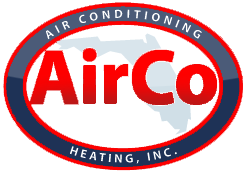In Palm Beach County, preparing for hurricane season is an annual necessity for every homeowner. While much attention is rightly given to boarding up windows and securing loose items, it’s also crucial to protect and secure your HVAC system—your home’s heating, ventilation, and air conditioning unit. Here at AirCo, we understand the importance of safeguarding this vital component of your home comfort system before, during, and after a hurricane. Follow these expert guidelines to minimize damage and ensure your system is as storm-resistant as possible.
1. Secure the Outdoor Unit
The outdoor unit of your HVAC system, often referred to as the condenser, is particularly vulnerable during high winds and severe storms. Secure the unit with hurricane straps or bolts fixed into a concrete base. This will help prevent the unit from being lifted or moved by high winds, which can cause catastrophic damage to the system and your property.
2. Elevate Equipment if Possible
Storm surges and flooding are major concerns during hurricanes, especially in coastal areas like Jupiter. If your outdoor unit is at ground level, consider elevating it on a raised platform. For new installations, positioning the unit on an elevated platform can be a worthwhile investment to avoid flood damage.
3. Cover the Outdoor Unit
Before the storm hits, cover your outdoor unit with a breathable waterproof cover to protect it from flying debris and driving rain. However, make sure to turn the unit off before covering it, as running the AC with a cover on can cause other serious issues, such as overheating.
4. Clear the Area Around Your HVAC
Ensure that the area around your outdoor HVAC unit is clear of debris, such as branches, lawn furniture, and gardening equipment. These items can become airborne during a hurricane and damage your unit. A clean and clear area will reduce the risk of such impacts.
5. Inspect and Reinforce Ductwork
Inspect your home’s ductwork for any signs of weakness or leaks. Strong winds and pressure changes during a storm can exacerbate any existing issues with your ducts, potentially leading to water damage and inefficient system performance. Make sure all ducts are well-sealed and insulated.
6. Install a Surge Protector
Power surges are common during hurricanes and can severely damage electronic appliances, including your HVAC system. Installing a high-quality surge protector for your HVAC system can prevent costly damage to the circuitry and prolong the life of your unit.
7. Consider a Backup Generator
In case of power outages, having a backup generator can keep your HVAC system running and maintain climate control in your home. This is particularly important not just for comfort but for preventing humidity-related issues that can arise when the system is off, such as mold growth.
8. Routine Maintenance Checks
Before hurricane season begins, schedule a maintenance check-up with a professional HVAC service like AirCo. Ensuring that your system is in optimal working condition can make it more resilient to the stresses of a storm. Regular checks can identify potential issues that may be exacerbated by severe weather, such as clogged drains or loose components.
9. Create an Action Plan
Develop a plan for what you will do with your HVAC system when a hurricane is imminent. This plan should include when to turn off your system, how to secure and protect the equipment, and whom to call for a post-storm inspection. This readiness can save valuable time and reduce stress when a storm is approaching.
Conclusion
Taking proactive steps to protect and secure your HVAC system during hurricane season is crucial for any homeowner in Jupiter, FL. By following these expert tips from AirCo, you can help minimize potential damage and ensure your system continues to operate efficiently after the storm has passed. Remember, the best defense is a good offense. Don’t wait until the last minute—prepare your HVAC system well ahead of the hurricane season to avoid the rush and potential resource shortages. For more advice or to schedule a pre-season maintenance check, contact AirCo today. Let’s keep your home safe and comfortable, no matter the weather.



